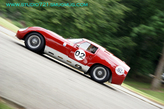1965 Maserati Tipo 151
|
When a class was established at LeMans, intended for experimental cars with a displacement of up to four-liters, Ferrari and Aston Martin enthusiastically began preparation. Seeing an opportunity, Maserati quickly followed by preparing prototype cars for this new class.
Maserati had built a lightweight and very rigid multi-tubular space-frame chassis which it had used for its front and mid-engined Birdcage sportscars. Chief engineer Giulio Alfieri declined the use of the Birdcage chassis and instead chose the conventional ladder frame design. The engine chosen was the V8 unit used by Maserati in a number of their other endeavors, including the 5000 GT road-going car. |
|
A number of modifications were necessary to prepare the 8-cylinder unit for racing at this level of competition. The first of the changes was to make it eligible for racing. The smallest 8-cylinder version of the engine at Maserati's disposal was 4.2-liters in size. By decreasing the bore by 2.8mm, the four-liter size was ascertained.
The engine was placed in the ladder frame which had double wishbones in the front and DeDion type axle in the rear. The rear setup was reinforced with additional struts, coil springs, and hydraulic shock absorbers which was able to absorb the power from the 360hp engine. A Colotti five-speed gearbox, rack-and-pinion steering, and disc brakes were used. The body of the car was created with the help of the Milan University. It was a curveacous coupe with a cut-off Kamm-like tail in the rear.
The engine was placed in the ladder frame which had double wishbones in the front and DeDion type axle in the rear. The rear setup was reinforced with additional struts, coil springs, and hydraulic shock absorbers which was able to absorb the power from the 360hp engine. A Colotti five-speed gearbox, rack-and-pinion steering, and disc brakes were used. The body of the car was created with the help of the Milan University. It was a curveacous coupe with a cut-off Kamm-like tail in the rear.
For the 1962 24 Hours of LeMans, three Maserati Prototypes were entered. They had been dubbed the Tipo 151, which would later be known as the Tipo 151/1 as future versions were created. The Briggs Cunningham team was in command of two of the cars while the third was in control of the French Maserati team headed by Colonel Simone. Cunningham's cars qualified third and fourth behind a pair of Ferraris. The race would end prematurely for the three Tipo 151. The cars had been able to keep pace with the lead pack but this was short lived. Two of the Tipo 151's would retire due to mechanical problems. The third car retired due to an accident caused by brake pads that had been installed incorrectly. These pads, installed during a pit stop, caused the car to roll, damaging its oil coolers and side-lining it prematurely.
After the race, the cars were repaired by the factory and the Cunningham cars were sent to the US. They were campaigned for a short period but enjoyed little success. One of the two cars was destroyed in a fire at Daytona. The third car remained in Europe and prepared for the 1963 LeMans race. Racing regulations were changed and no longer limited the size of the engine to four-liters. In response, the Maserati engine was replaced with a five-liter fuel-injected engine. In this guise, the car was re-named the 151/2. At LeMans, it raced for four hours before retiring.
Development of the Tipo 151 continued, even though Ferrari's mid-engined cars had proven dominant at LeMans. A number of changes were made to the Tipo 151, including adding additional length to increase stability at speed. The body changed; it was now fitted with a Pierre Drogo-designed body that featured a high Kamm-type tail and a flat roof. The engine displacement size increased, bringing horsepower to 450 bhp. Large 15-inch Borrani wheels and wide Dunlop tires were fitted on all four corners. These changes brought about the new name, the Tipo 151/3.
It was brought to LeMans in 1964 where it raced for nine hours (99 laps) before retiring due to electrical problems. It was a fast car reaching nearly 200 mph down the Mulssane Straight. It was later raced at Reims and the Paris 1000K where it also DNF'ed.
After the race, the cars were repaired by the factory and the Cunningham cars were sent to the US. They were campaigned for a short period but enjoyed little success. One of the two cars was destroyed in a fire at Daytona. The third car remained in Europe and prepared for the 1963 LeMans race. Racing regulations were changed and no longer limited the size of the engine to four-liters. In response, the Maserati engine was replaced with a five-liter fuel-injected engine. In this guise, the car was re-named the 151/2. At LeMans, it raced for four hours before retiring.
Development of the Tipo 151 continued, even though Ferrari's mid-engined cars had proven dominant at LeMans. A number of changes were made to the Tipo 151, including adding additional length to increase stability at speed. The body changed; it was now fitted with a Pierre Drogo-designed body that featured a high Kamm-type tail and a flat roof. The engine displacement size increased, bringing horsepower to 450 bhp. Large 15-inch Borrani wheels and wide Dunlop tires were fitted on all four corners. These changes brought about the new name, the Tipo 151/3.
It was brought to LeMans in 1964 where it raced for nine hours (99 laps) before retiring due to electrical problems. It was a fast car reaching nearly 200 mph down the Mulssane Straight. It was later raced at Reims and the Paris 1000K where it also DNF'ed.
A year later, it was destroyed while testing for LeMans. This left the ex-Cunningham car as the sole survivor. The car remained in the United States until 1983 when it was purchased by Peter Kaus and became part of the Rosso Bianco Collection. In 2006 it was offered for sale at Bonham's Gstaad Auction where it sold for CHF 1,850,000.
The Tipo 151 cars never secured a major victory. Often, they were running strong, near the front, but forced to retire due to mechanical problems. One prototype and two examples were ever created; another car was later built using the original buck from and a copy of the 151/3 Drogo body.
By Daniel Vaughan | Sep 2008
The Tipo 151 cars never secured a major victory. Often, they were running strong, near the front, but forced to retire due to mechanical problems. One prototype and two examples were ever created; another car was later built using the original buck from and a copy of the 151/3 Drogo body.
By Daniel Vaughan | Sep 2008



